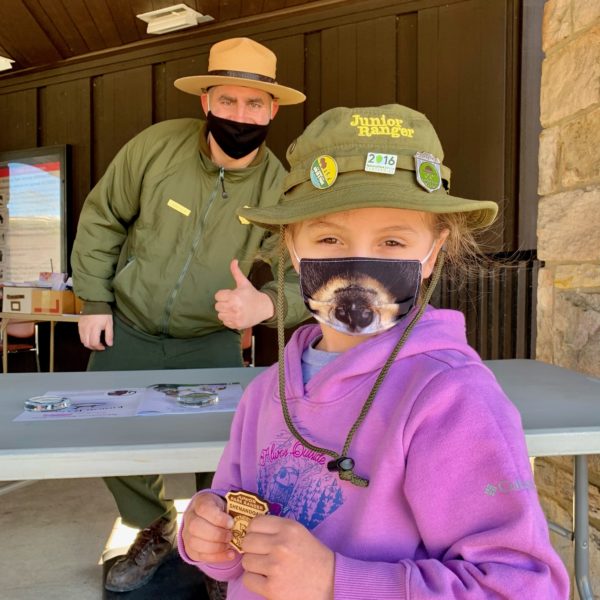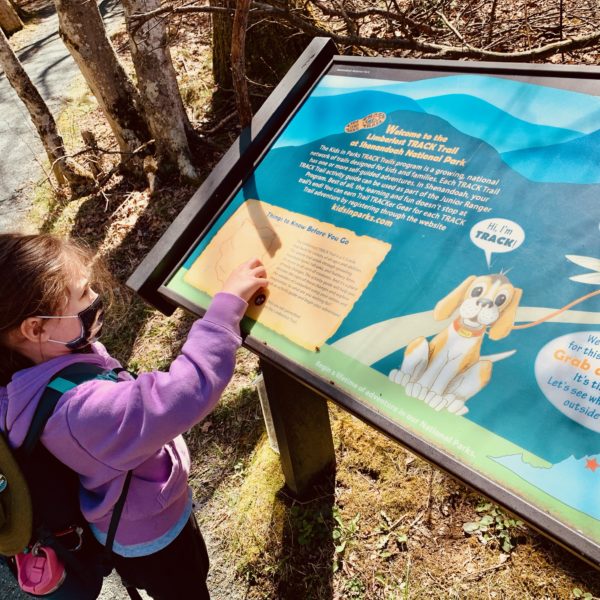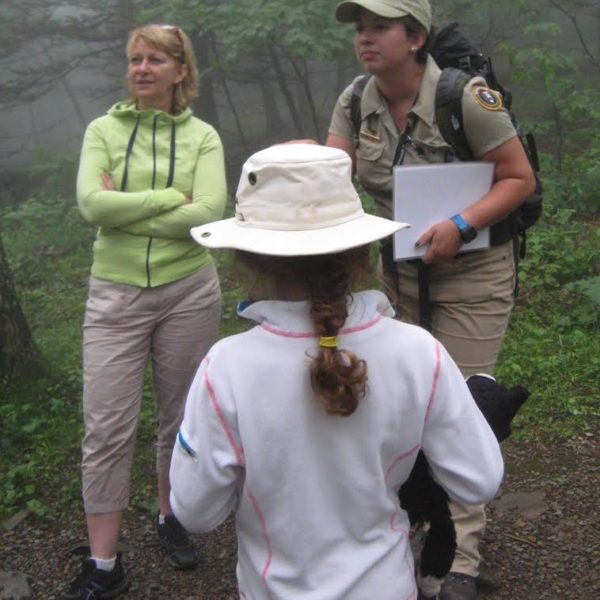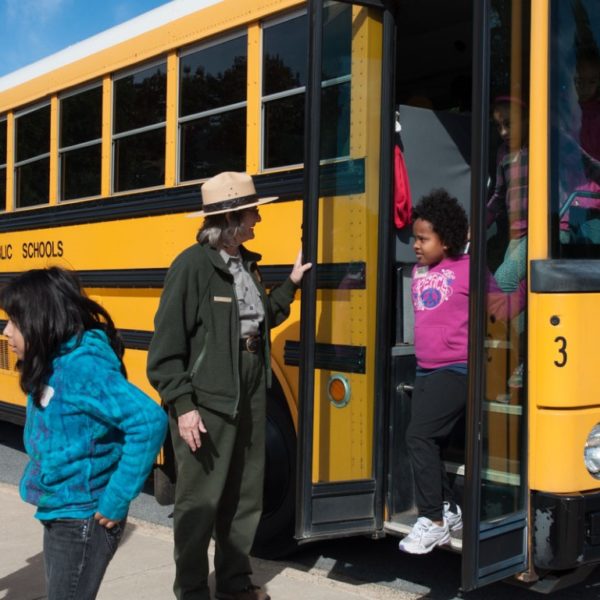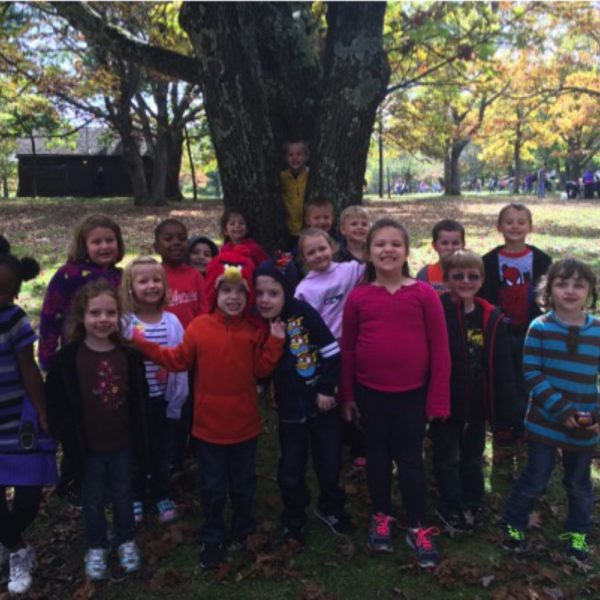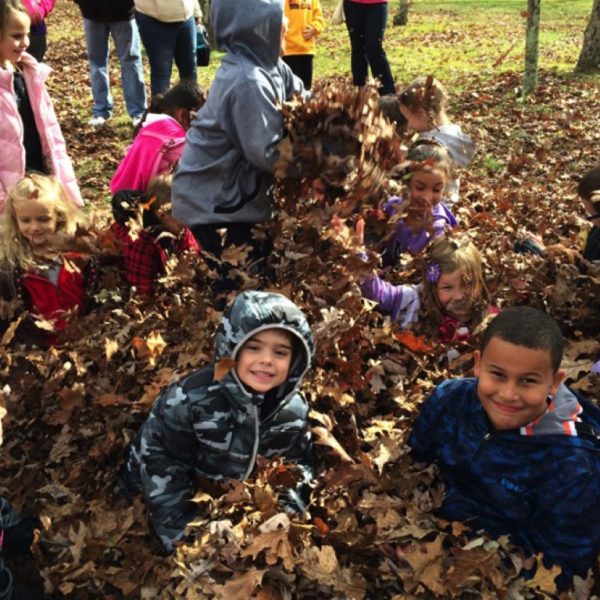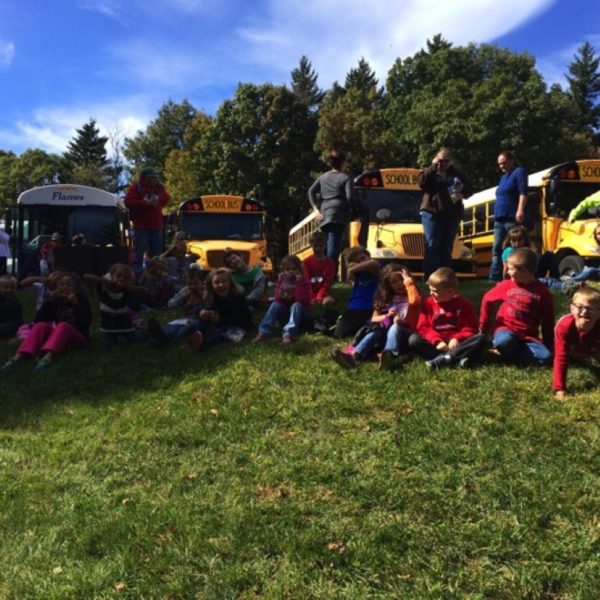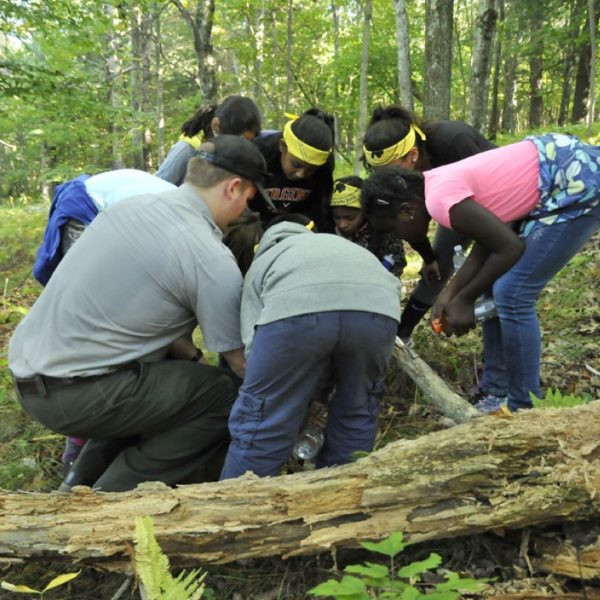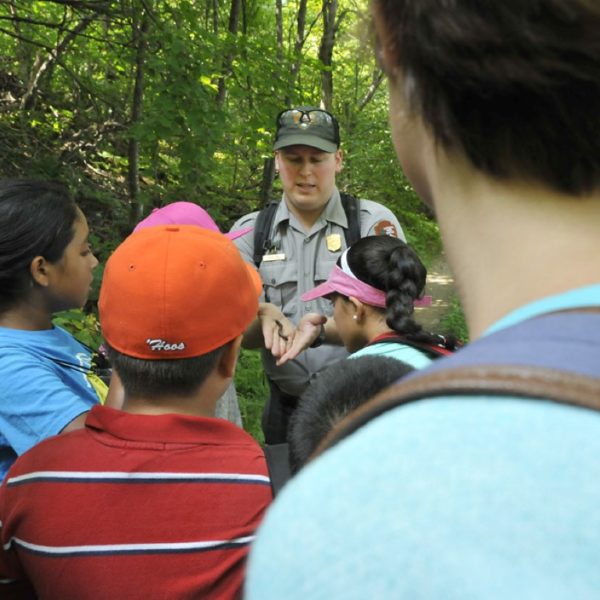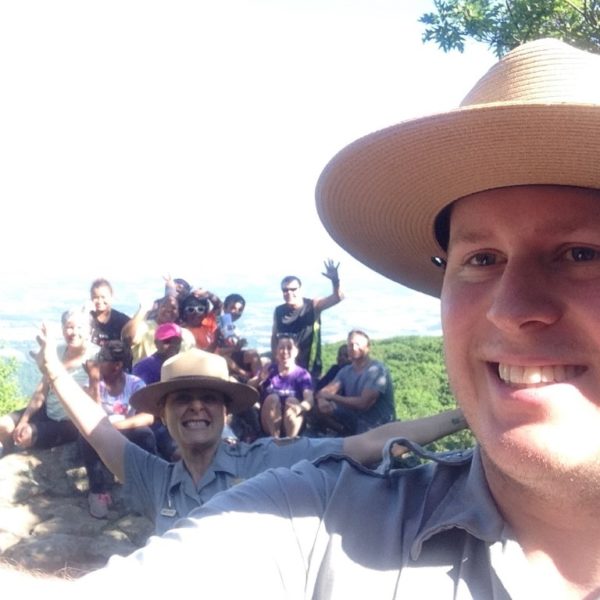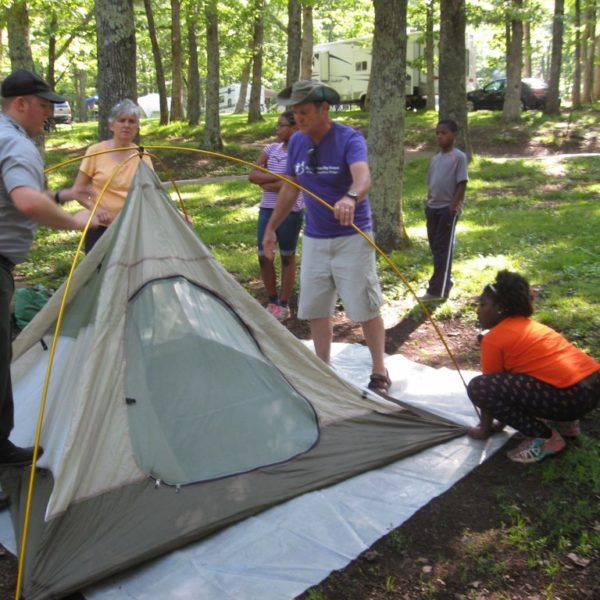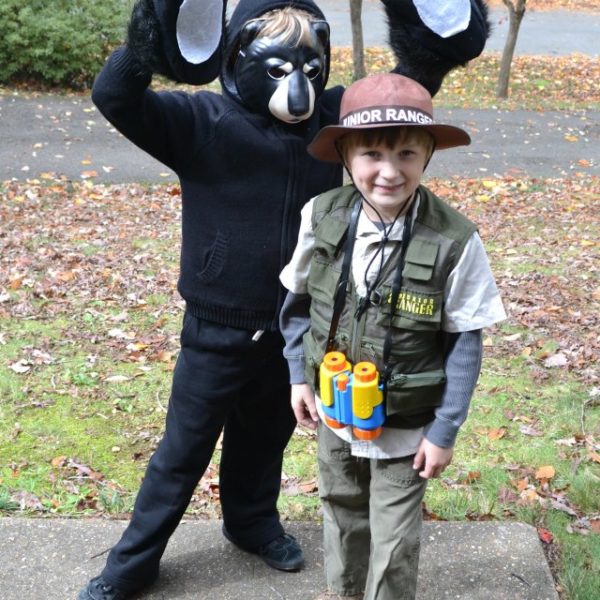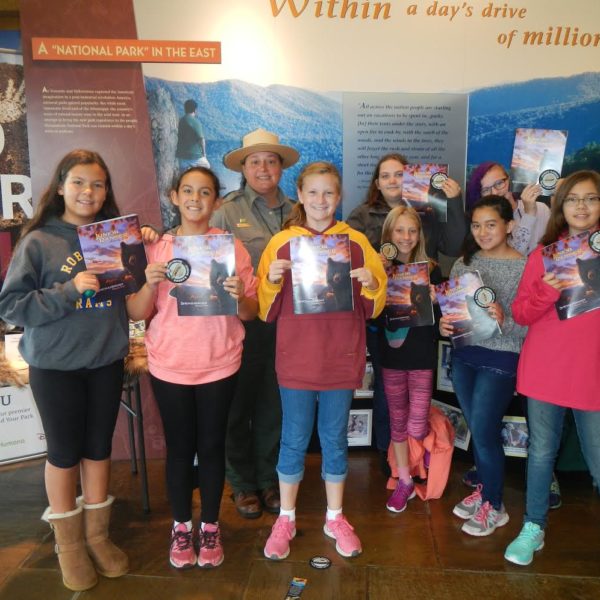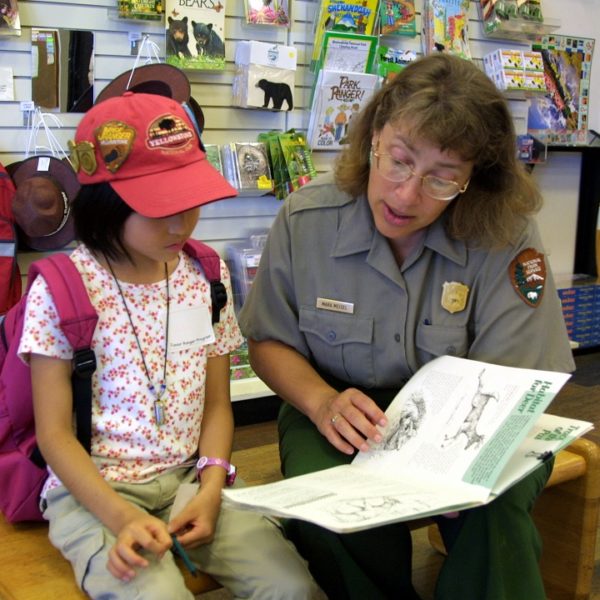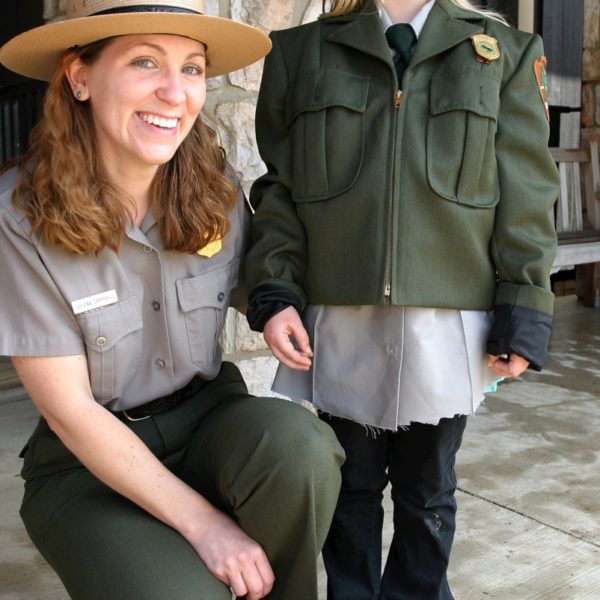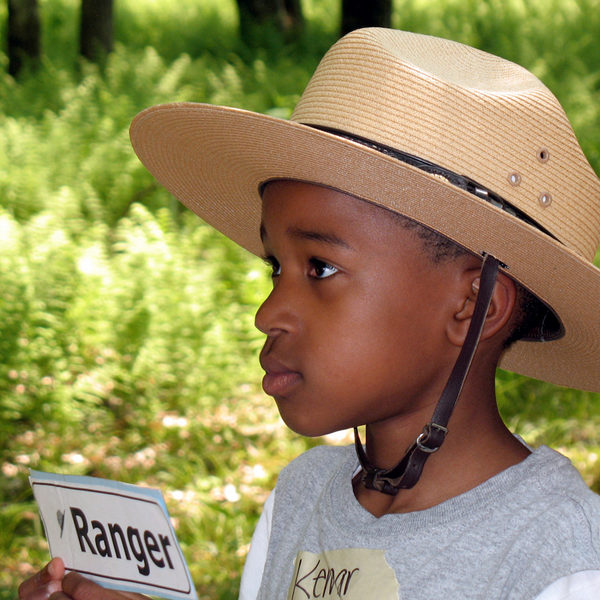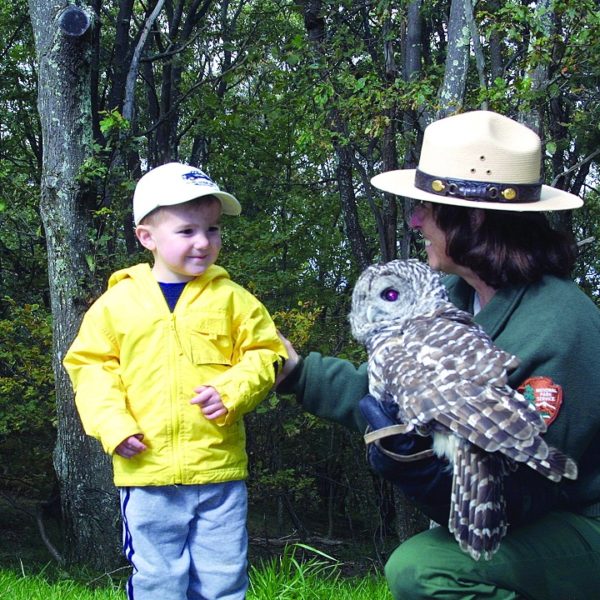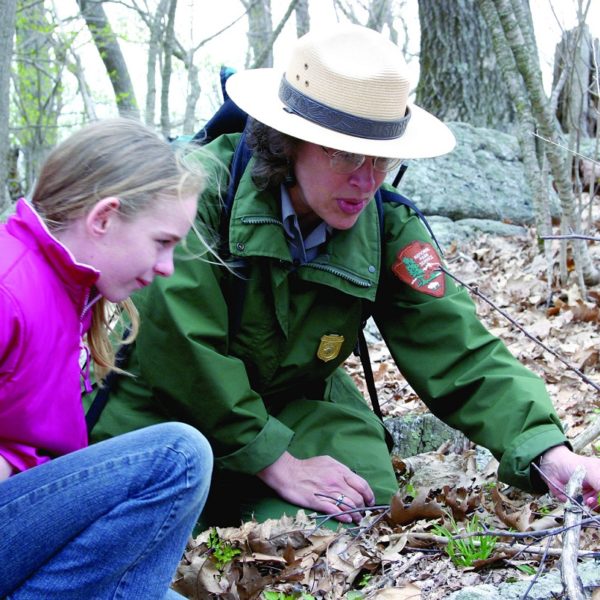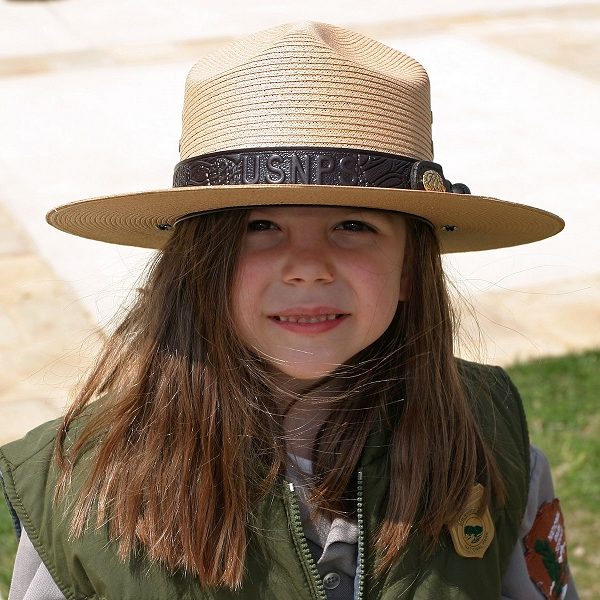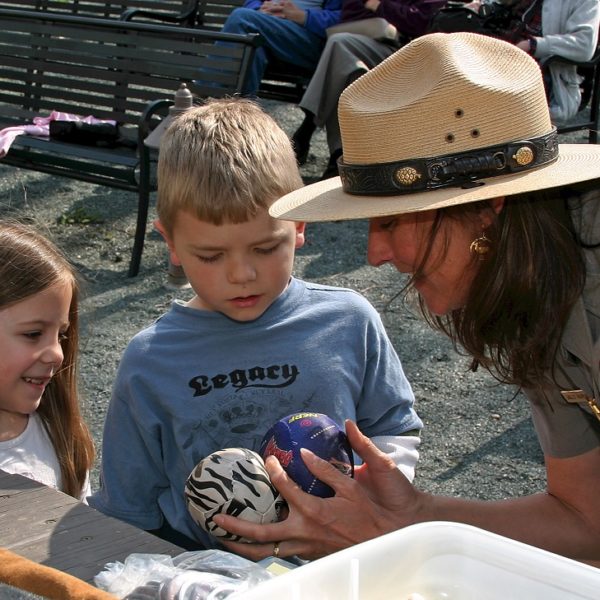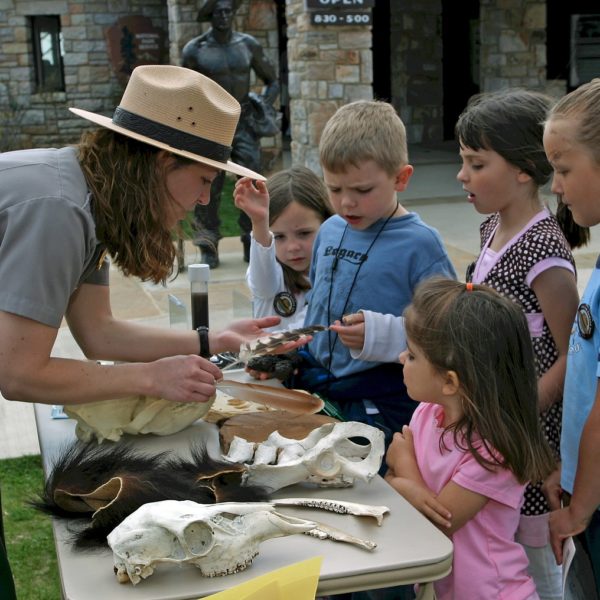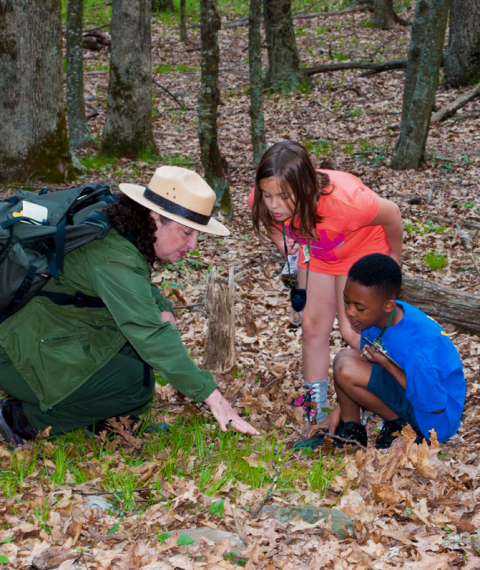SNP Trust supports Shenandoah National Park’s Education Programming, providing a broad range of recreational, educational, and service-learning experiences in Shenandoah National Park for youth and young adults.
The goal of Play, Learn, Serve is to provide meaningful national park experiences for audiences of all ages that instill a love and appreciation for Shenandoah National Park (and national parks in general!). This program funds in-park field trips, summer youth camps, and virtual learning programs, along with professional development opportunities for educators for young people ho may not otherwise have a chance to visit the park.
Play, Learn, Serve directly supports these five components:
- Curriculum-based in-park school field trips- Provides formal educational programming for schools to bring educational groups to the park. Annually serves approximately 5000 students from schools surrounding the park.
- Curriculum-based in-school programs- Provides formal educational programming at local schools for 4th and 5th grade classes. Annually serves approximately 2000 students at schools surrounding the park.
- Summer Youth Engagement- Provides youth engagement and service-learning programs for youth organizations such as Groundwork, Big Brother/Big Sisters, Boys and Girls Clubs, and volunteer youth groups. Annually serves approximately 1000 youth during the summer months.
- Professional Development for Educators- Provides workshops and professional development programs for formal and non-formal educators and park staff including Teacher-Ranger-Teacher program. Annually serves 50-100 educators and 1-2 Teacher-Rangers.
- Distance Learning- Provides opportunities to develop and implement internet-based distance learning programs including live webcasts and interactive, multimedia virtual field trips, videos, and student activities.
Play
Step Up to the Great Outdoors
Our partnerships with Boys and Girls Club, Big Brothers Big Sisters, & YMCAs of Virginia sparked the creation of a three-part initiative that introduces under-served children to Shenandoah National Park–starting by bringing Park Rangers to their neighborhoods and culminating in an overnight camping trip in the national park.
Step #1 involved Park Rangers traveling to the children’s schools and neighborhoods to bring park artifacts, like deer antlers and bear fur. Step #2 was a day trip to Shenandoah National Park. With their Park Rangers, the children hiked, played and ate a picnic lunch. For many, it was their first visit to a national park. Step #3 was an overnight camping trip in Shenandoah. The kids learned to pitch tents, cook on a camp stove, and hike to new summits. Each camper received their own sleeping bag as a memento of the experience and incentive to spend more time under the stars.
The camps are structured as a three-way partnership: Shenandoah National Park provides the venue and the Park Rangers to conduct the programming; organizations working with under-served youth recruit campers and serve as chaperones; and the Trust provides the funding. The Trust’s goals for these campers are to:
- Engage in new experiences that push them beyond their comfort zone, in a safe and supportive environment
- Learn teamwork
- Set goals and achieve success
- Foster a desire to serve/volunteer
- Get exercise
- Connect with nature
- Develop a sense of ownership/stewardship of Shenandoah National Park
Based on the success of these camps, the Trust is now building the park’s capacity to partner with additional organizations, especially those who serve disadvantaged youth in the park’s gateway communities. Big Brothers Big Sisters (BBBS) and Boys and Girls Club (BGC) have strong reputations and the children they serve live less than 30 minutes from Shenandoah National Park.
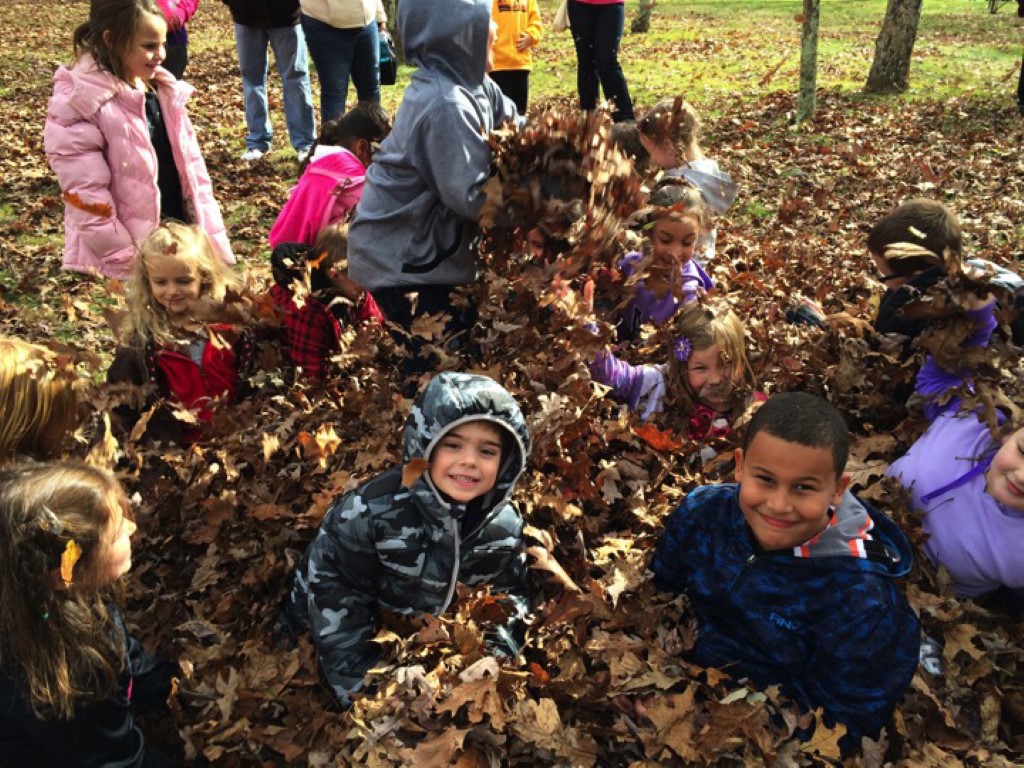
“I never thought I would enjoy sleeping outside or working outside in the summer. It was hot and sweaty, but it was the best time I ever had.”
“Being in the woods lightened my spirit and made me happy. It increased my confidence. I did things I didn’t think I could do before. I won’t say I CAN’T anymore!”
Learn
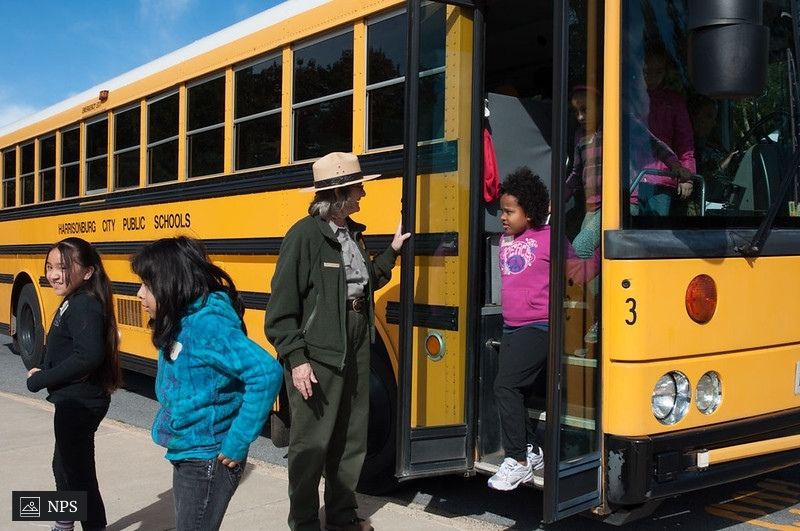
Ticket-To-Ride
Shenandoah National Park is a preeminent outdoor classroom. With our Ticket-to-Ride program, teachers are provided, at no cost, pre-field trip curricula and post-trip materials. In the park, they can choose to do a self-guided program or be led by a Park Ranger. All educational curricula comply with federal and state (Virginia) standards of learning.
In the face of shrinking school budgets, field trip funding is often the first “extra” to be cut, leaving thousands of children—many of whom live very close to Shenandoah National Park—without any means to experience their “backyard” national park.
Let’s not let transportation costs be a barrier to these remarkable opportunities. You help us defray school bus costs by funding Ticket-to-Ride and get 5,000 students to their national park.
Serve
Groundwork RVA
SNPT partnered with organizations including SoulTrak Outdoors and GroundworkRVA to offer youth from around the country immersive summer camp experiences while serving in Shenandoah National Park.
Notes from the Field
Formal Education Programs: Curriculum-based education programs that meet local, state, and national learning standards to support formal classroom instruction for kindergarten to adult learners. These are in-class, in-park and virtually.
- We offered virtual programs year-round
- We offered in-Park programs earlier in April thanks to internship opportunities. We offered them April-June and late August-October.
- We offered in-class programs for the first time since Covid!
- Did three virtual and one in-park teacher workshops!
- Did a variety of new programming for teachers, as well, to test out demand for new curriculum.
Summer and after-school youth engagement programs: Programs designed to introduce children and youth to the outdoors through educational and recreational experiences.
- Some are 1-day, some are multi-day overnight and some are multi-day over multiple different weeks.
- These were offered in-park and offsite with some virtual pre-site components
Service-learning Programs: Extended, in-depth programs held over multiple days that provide recreational (“Play”) and educational (“Learn”) experiences coupled with work projects (“Serve”).
- We worked closely with our VIP office to work with a multitude of overnight or 1-day groups looking to do service and learning. A few examples are:
- George Mason
- SoulTrak Outdoors
- Art180
- Shen Youth Corps
- GroundworkRVA
- Other ACC crews
- Scout groups
Outreach: Community programs and events in surrounding communities!
We continued used a scheduling system that allows field trip programs in the morning for area schools with a slot for a distance learning program in the afternoon for schools too distant to visit the park in person whenever staffing allowed.
The Education Team also continued expanding some programs to include hosting on-line programs as a pre-visit and post-visit sessions for schools that came on a field trip to the park. The team utilized the new Big Meadows live webcam during distance learning programs and is continuing to explore additional options for involving new technology.
Distance learning programs occurred for schools across the country, including with the Idaho School for the Deaf and Blind, for which we partnered with an ASL interpreter to provide instruction to the students. We also worked with dual-language schools. For in-park programs, the education team utilized the Big Meadows area and Stony Man trails to provide regular programming as well as using the Limberlost trail as an accessible alternative for multiple schools and had students that use wheelchairs with them. They also increased access to Spanish versions of forms sent to teachers and students.
Following the fall field trip season, the team switched to distance learning programs for the winter months which continued to April. The education team also participated in the Ohio Distance Learning Association K-12 Technology Conference in February 2023 to connect with educators as well as advertise available programming through Shenandoah National Park.
In the spring of 2023, the team returned to the combination of scheduling both field trips and distance learning programs.
In August 2022, the Park was awarded a National Environmental Education Foundation (NEEF) grant to participate in a collaborative network with four local schools from Page County and Harrisonburg County as well as Page Alliance for Community Action (PACA) and James Madison University (JMU) and Gus Bus in Harrisonburg to teach students about the park and build pollinator gardens at three of the four schools. The education team conducted virtual and after-school programming with these schools throughout the school year using state standards of learning as well as activities to prepare the students for building a garden.
They received the grant for a second time this year and will continue with monthly visits at four schools (two repeating and two new – three in Page County and one in Harrisonburg) throughout the 2023-24 schoolyear to improve their school area through citizen science and personal projects.
There was an easing of COVID-19 pandemic restrictions in 2021-2022 allowing for a return to more “normal” education and youth programming. Full in-person programs returned for all components of Play, Learn, and Serve. The Education Team was able to resume a full schedule of in-park programs while integrating distance learning program opportunities into the schedule. The team continues to balance in-person and on-line programming and explore new ways of using distance learning.
Seventeen area youth organizations were sent an email in February 2022 inviting them to participate in summer programming with Shenandoah National Park. Thirteen responses were received with 4 no responses. The continuing impact of COVID-19 along with youth organization staffing changes and shortages limited the participation in summer programs. However, 12 new youth organizations were added, and we resumed overnight camps with Groundwork RVA (2 camps), Contigo Youth Club, and Elk Hill Children and Family Services. Thirty-two programs for sixteen youth organizations were hosted over the summer.
Following the fall field trip season, the team switched to distance learning programs for the winter months. These programs continued to be very much in demand. In the spring of 2022, we returned to the combination of scheduling both field trips and distance learning programs. We also were able to resume the in-park Teacher Workshop in September which had not been offered since 2019 due to COVID. Sixteen area teachers participated, learning how to effectively integrate the park’s in-park field trip education programs into their classroom curriculum.
The 2020-21 school year began with COVID-19 health and safety restrictions fully in place. No in-person, in-park programs were allowed; schools were nearly 100% virtual learning (students all at home); no travel to schools was permitted. The Education Team converted our ‘normal’ 2-hour in-park field trip lesson plans for K-high school classes to 1-hour distance learning programs to provide teachers and students ‘virtual field trips’ to Shenandoah National Park. The virtual field trips became very popular and successful at connecting with teachers and students during the pandemic.
By June, COVID-related restrictions began to ease. The Education Team transitioned to summer programming with a focus on Youth Engagement and Service–Learning Programs. However, several summer school programs requested both in-person and distance learning education programs. The team also began planning for a return to in-park school field trips for the 2021-22 school year. The team focused on preparing the in-park program sites (last used in 2019) and developing their individual lesson plans for 2nd – high school curriculum-based programs. We resumed in-person field trip programs for the 2021-22 school year on September 13. There have been a few COVID-related cancelations from schools, but we have been able to offer a distance learning alternative or re-fill cancelations with another school.
The COVID-19 pandemic had significant impact on accomplishing the goals of this project. The park’s education staff had to adjust their approach to youth programming by focusing their efforts on developing and providing internet-based distant learning programs. With all 2020 field trips to the park cancelled the education staff was challenged to develop virtual on-line versions of their curriculum-based field trip programs for K-12th and present fun and engaging park experiences delivered electronically to our other community partners. Ten live virtual field trips were created and offered. You can find the offerings here: https://www.nps.gov/shen/learn/education/learning/distance-learning.htm
The feedback they received was overwhelmingly positive. “I wanted to reach out and thank you for the wonderful virtual program that you provided for our class! The students loved it. Some families were so inspired that they have made a trip to the park!”
Due to safety restrictions around in-person programming, all of the park’s summer youth engagement opportunities were eventually cancelled. Although many of our community partners were interested, they realized that it was unlikely they would be allowed to bring youth to the park. In response the education staff developed a plan to provide weekly programs over the course of 6 weeks, alternating between live distance learning programs and pre-recorded ranger program videos. The live distance learning programs were recorded and sent to groups that requested exclusively pre-recorded videos. The pre-recorded ranger program videos also now serve as “junior ranger” videos for public release. Check them out here: Virtual Ranger Programs – Shenandoah National Park (U.S. National Park Service) (nps.gov)
The Play Learn Serve project provides a broad range of recreational, educational, and service-learning experiences in Shenandoah National Park for youth through senior adult audiences. The Trust’s funding, thanks to donors, supports a major portion of the park’s education operation:
Curriculum-based Education
In 2019 SNP Trust funded three temporary GS-07 Education Technicians for the education program. The curriculum-based education programs include in-park field trips for area schools, and in-classroom programs for 4th and 5th grade classes. In 2019 the curriculum-based education programs held 166 programs, touching 4025 students,
Summer Youth Engagement Programs
Building on the success of 2018, in 2019 the education staff consulted with individual youth organization leaders to develop day-visit programs based on the current Shenandoah National Park Junior Ranger Book with the overall goal to introduce the youth to the great outdoors and foster stewardship of their national parks. In working with youth organization staff, it was determined to develop two age-appropriate programs for ages 5-11 (wildlife habitats) and 12-18 (outdoor recreation/Leave No Trace).
Working with Boys & Girls Clubs in Fauquier, Madison, Orange, Rockingham and Albemarle County, YMCA’s in Augusta County and Big Brothers Big Sisters of Central Virginia- 531 youth were introduced to Shenandoah National Park over the summer.
The Trust also funded a service-learning camp for the Groundwork Richmond Green Team. This group of young adults camped in Shenandoah National Park for a week in July and completed projects including trail work, invasive species removal, dragonfly larva collection (mercury sampling), and staining amphitheater benches.
Educator Professional Development
The Teacher Ranger Teacher (TRT) program is an extended professional development opportunity for K-12 classroom teachers to learn about the resources and educational materials available through the National Park Service. Teachers selected as Teacher-Rangers spend the summer working with Park staff on education projects, learning about park resources and visitor services, and developing lesson plans to use in their classrooms. Once they return to their schools, teacher-rangers bring their national park knowledge and experiences into the school and classrooms throughout the school year to engage students, faculty, and staff in lessons and activities that relate to Shenandoah National Park. In 2019 the Trust funded two local teachers from Luray, VA to spend 8-10 weeks in Shenandoah over the summer. Their project was to create curriculum-based education lessons for 6th-8th grade middle school students with an emphasis on incorporating science, technology, engineering, and math (STEM). The curriculum developed included opportunities for outdoor field investigations in Shenandoah National Park
